
Randolph Denard Ornette Coleman was an American jazz saxophonist, trumpeter, violinist, and composer. He was best known as a principal founder of the free jazz genre, a term derived from his 1960 album Free Jazz: A Collective Improvisation. His pioneering works often abandoned the harmony-based composition, tonality, chord changes, and fixed rhythm found in earlier jazz idioms. Instead, Coleman emphasized an experimental approach to improvisation, rooted in ensemble playing and blues phrasing. AllMusic called him "one of the most beloved and polarizing figures in jazz history," noting that while "now celebrated as a fearless innovator and a genius, he was initially regarded by peers and critics as rebellious, disruptive, and even a fraud."
Charles Moffett was an American free jazz drummer.
Wilbur Bernard Ware was an American jazz double bassist. He was a regular bassist for the Riverside record label in the 1950s, and recorded regularly in that decade with Johnny Griffin, Kenny Dorham, Kenny Drew, and Thelonious Monk. He also appeared on records released by J.R. Monterose, Toots Thielemans, Sonny Clark, Tina Brooks, Zoot Sims, and Grant Green, among others.
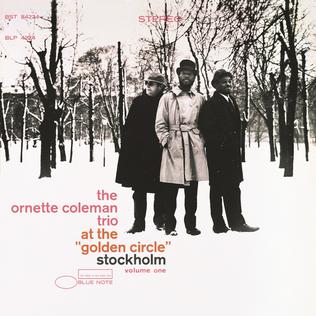
At the "Golden Circle" Stockholm, Vols. One & Two are a pair of separate but related live albums by the Ornette Coleman Trio, recorded at the Gyllene Cirkeln jazz club in Stockholm over December 3–4, 1965 and released on Blue Note in early 1966.

Stereo Drive is an album by jazz musician Cecil Taylor featuring John Coltrane. It was released in 1959 on United Artists Records, catalogue UAS 5014. The mono edition was issued as UAL 4014 with the title Hard Driving Jazz credited to The Cecil Taylor Quintet, and later reissued under Coltrane's name in 1962 as Coltrane Time. Compact disc reissues appeared on the Blue Note Records label credited to Coltrane. It is the only known recording featuring both Coltrane and Taylor.
The New York Contemporary Five was an avant-garde jazz ensemble active from the summer of 1963 to the spring of 1964. It has been described as "a particularly noteworthy group during its year of existence -- a pioneering avant-garde combo" and "a group which, despite its... short lease on life, has considerable historical significance." Author Bill Shoemaker wrote that the NYCF was "one of the more consequential ensembles of the early 1960s." John Garratt described them as "a meteor that streaked by too fast."

Ming is an album by David Murray, released in 1980 on the Italian Black Saint label and the first to feature his Octet. It features performances by Murray, Henry Threadgill, Olu Dara, Lawrence "Butch" Morris, George E. Lewis, Anthony Davis, Wilber Morris and Steve McCall.

Evolution is the debut album led by the American trombonist Grachan Moncur III, recorded in 1963 and released on the Blue Note label. Featuring alto saxophonist Jackie McLean, trumpeter Lee Morgan, vibraphonist Bobby Hutcherson, bassist Bob Cranshaw and drummer Tony Williams, Evolution is considered a significant contribution to the jazz avant-garde. Two McLean albums also recorded for Blue Note in 1963 featured Moncur and his compositions, and explored the same "inside/outside" musical approach.

Eugene (1989) is an album by American saxophonist and composer Anthony Braxton with the Northwest Creative Orchestra recorded at the University of Oregon in 1989 for the Italian Black Saint label.
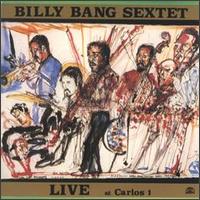
Live at Carlos 1 is a live album by the American jazz violinist Billy Bang recorded in 1986 and released on the Italian Soul Note label.

Freedom Together! is an album by pianist Jaki Byard recorded in 1966 and released on the Prestige label.

The Teddy Charles Tentet is a 1956 jazz album featuring a tentet led by multi-instrumentalist Teddy Charles. Critically well received, the album is listed as one of the "Core Collection" albums in The Penguin Guide to Jazz and an essential recording in 2000's The Essential Jazz Records: Modernism to Postmodernism. Released originally in high fidelity vinyl by Atlantic, the album has been reissued on CD and LP multiple times since 2001.

It's All Right! is an album by the saxophonist Teddy Edwards which was recorded in 1967 and released on the Prestige label.
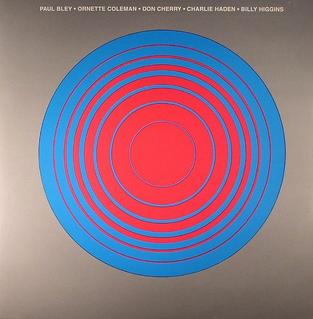
Live at the Hilcrest Club 1958 is a live album by pianist Paul Bley, saxophonist Ornette Coleman, trumpeter Don Cherry, drummer Billy Higgins and bassist Charlie Haden recorded in California in 1958 and released on the Inner City label in 1976. The album was the first live recording of Ornette Coleman, made shortly after he recorded his first album, Something Else!!!! and featuring the group that would soon record the Atlantic albums The Shape of Jazz to Come (1959) and Change of the Century (1960).

Eyes in the Back of Your Head is an album by the pianist Geri Allen, recorded in late 1995 and early 1996 and released on the Blue Note label.

Revolt of the Negro Lawn Jockeys is an album by American jazz saxophonist Jemeel Moondoc, which was recorded live at the 2000 Vision Festival and released on the Eremite label. It was a reunion with vibraphonist Khan Jamal, who recorded with Moondoc before on the album Konstanze's Delight. The quintet also features Nathan Breedlove on trumpet, John Voigt on bass and Codaryl Moffett on drums.
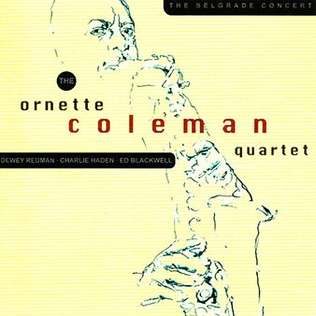
The Belgrade Concert is a live album by Ornette Coleman. It was recorded in November 1971 in Belgrade, and was released by Jazz Door in 1995. On the album, which was recorded one day after the concert documented on Live in Paris 1971, Coleman is joined by saxophonist Dewey Redman, bassist Charlie Haden, and drummer Ed Blackwell.
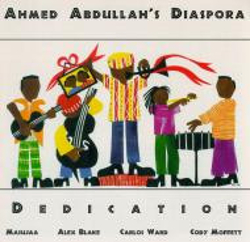
Dedication is an album by trumpeter Ahmed Abdullah. It was recorded on June 17 and 18, 1997, at the Spirit Room in Rossie, New York, and was released in 1998 by CIMP. On the album, Abdullah is joined by members of his band Diaspora: saxophonist and flutist Carlos Ward, guitarist Masujaa, bassist Alex Blake, and drummer Cody Moffett, son of Charles Moffett, to whom the album is dedicated.

Song for Biko is an album by the Johnny Dyani Quartet, led by bassist Dyani, and featuring saxophonist Dudu Pukwana, cornetist Don Cherry, and drummer Makaya Ntshoko. It was recorded on July 18, 1978, and was released on vinyl in 1979 by SteepleChase Records. In 1994, the album was reissued on CD with an extra track. The dedication in the album title refers to anti-apartheid activist Steve Biko, who was killed by South African security officers in 1977.

Who's Crazy?, Volumes 1 and 2, is a pair of albums by Ornette Coleman containing music that was intended as the soundtrack for a film of the same name, directed by Thomas White and featuring members of The Living Theatre. The albums, which feature Coleman on alto saxophone, trumpet, and violin, accompanied by double bassist David Izenzon and percussionist Charles Moffett, were recorded in Paris during 1966, and were initially released on vinyl by Atmosphere Records, an imprint of the French I.R.I. label, with the title Who's Crazy? La Clef Des Champs. In 1982, both LPs were reissued by Affinity Records, a subsidiary of Charly Records, as part of a box set compilation.

















